Riding from Memories Read online
Warning: The unauthorized reproduction or distribution of this copyrighted work is illegal. No part of this book may be scanned, uploaded or distributed via the Internet or any other means, electronic or print, without the publisher’s permission. Criminal copyright infringement, including infringement without monetary gain, is investigated by the FBI and is punishable by up to 5 years in federal prison and a fine of $250,000 (http://www.fbi.gov/ipr/).
Published by The Hartwood Publishing Group, LLC,
Hartwood Publishing, Phoenix, Arizona
www.hartwoodpublishing.com
Riding from Memories
Copyright © 2018 by Jim Cox
Digital Release: February 2018
All Rights Reserved. No part of this book may be used or reproduced in any manner whatsoever without written permission, except in the case of brief quotations embodied in critical articles and reviews.
This book is a work of fiction. The names, characters, places, and incidents are products of the writer’s imagination, or have been used fictitiously and are not to be construed as real. Any resemblance to persons, living or dead, actual events, locales, or organizations is entirely coincidental.
Riding from Memories by Jim Cox
Disillusioned and heartbroken at the atrocities of the Civil War, Josiah Johnson, better known as Buck, finds himself an outcast as a Southern-born Alabama boy fighting for the North as a Union soldier.
Instead of letting the Mason/Dixon line dictate his values and loyalties, Buck follows his conscience and fights for freedom instead of oppression. By choosing a path only he understands, life is unpredictable and being scorned is a frequent occurrence.
Captured in battle and imprisoned in the horrendous conditions at the Confederate prison in Andersonville, Georgia, Buck knows it was either escape or die of starvation and sickness. Once free, he has one goal—start a new life in the western frontier as far away from the bloody battlefields and devastation as he can get. The journey west is full of danger and suspense and enough adventure to last a lifetime as Buck searches for his new life, hoping to rid himself of war memories.
Dedication
June… You’ve always been like a sister to me.
Prologue
In late December 1860, South Carolina declared secession from the United States. Ten other states followed suit, calling themselves the Confederate States of America—the Confederacy or, simply, ‘the South.” They wanted independence and were willing to fight for it with the Union, or simply, “the North.”
President Abraham Lincoln was reluctant to start the battle, fearing the consequences. He quoted from the Bible, Mark 3:25: “A house divided against itself cannot stand.” In efforts to prevent a flare-up, he moved Union troops into Fort Sumter, at the entrance to Charleston, South Carolina. This was pouring oil on the simmering embers. The newly formed Confederate States Army opened fire on the Union Army on April 12, 1861. The battle raged for three days, a battle the Confederacy won.
So began the Civil War.
Among the soldiers joining the Union Army was Josiah “Buck” Johnson, an 18-year-old from an Alabama farming family. He was 21 at the war’s end. During that time Buck had spent months held captive in the Confederate prison camp in Andersonville, Georgia.
Andersonville Prison was opened in February, 1864, and closed in 1865. Forty-five thousand men were imprisoned there during this thirteen-month period and over thirteen thousand died.
Conditions were appalling.
Rotting, fly-covered corpses piled up against the prison fences, to be dumped in mass pits, with rats scurrying about among the bodies. Other bodies stretched out on the ground among the living inmates. The captives were painfully thin, their skin seeming to hang from protruding bones. Untrimmed hair and beards coupled with dark hollow eyes made them look grotesque.
Many could barely stand. Some inmates wore clothes, but often only the lower half of dirty, baggy underdrawers. Most men wore no clothes at all. There were no sleeping cots or blankets, no toilets, no water, and the only food available was watered-down slop not fit to eat.
Buck and his friend Joe managed to escape and began a painful, painstaking slow trek toward what remained of civilization. All Buck knew was that he was free. What lay ahead and what remained of the past he had known were questions still to be answered.
I hope you like, “Riding from Memories.”
Jim Cox
Chapter One
The barking was getting louder. It sounded like the dogs were less than a quarter of a mile away from the escapees and coming on strong! “Hurry up, Joe!” Buck’s Southern drawl carried an emergency tone in the mid-April, afternoon breeze. “If we don’t get to the swamp before the dogs reach us, we’ll be goners.”
“You go on, Buck,” Joe said, gasping for air, “Don’t wait on me, save yourself.” Joe paused, taking in more gulps of air. “I ain’t got the strength to run any faster. I’m all tuckered out.”
Buck looked back just in time to see his friend fall between the rows of last year’s dried-up cotton stalks. Time was of the essence, and he knew it would take a miracle to reach the swamp before the dogs caught up to them, but he couldn’t leave his friend behind. “Put your arm around my neck and hang on,” Buck said, turning back to Joe. “We’ll run side by side ’til we reach the swamp, but we gotta hurry, the dogs ain’t far behind.” Joe looked at Buck through sunken, desperate eyes and followed his instructions.
The cotton rows weren’t quite wide enough to accommodate both men running side by side. Buck stayed close to the stalks, and the stiff, dried-up limbs scraped his bare, unprotected legs, causing streaks of blood to ooze. The men’s only clothing were burlap feed sacks tied around their waists.
They had run for quite a time and were both gasping for air when an open field finally came into view several yards ahead, giving the escapees a spark of encouragement. They’d been told by prison inmates who were acquainted with the area that a large swamp just across the open field was their only possible means of escape. They were also told that several prisoners had attempted to escape in the past, but none had been successful. “Can we make it?” Buck mumbled between huffs. “The barks are getting louder.
Buck and Joe were exhausted by the time they were halfway through the open field and stopped for a breather. The swamp was visible perhaps a hundred yards away, as was evident by a thick grove of cypress trees, which Buck knew only grew in swamps. When Buck saw the backs of the hounds bobbing above the cotton stalks back in the field and four men on horses not far behind the dogs, he grabbed Joe’s arm, put it around his neck, and started running for the swamp, dragging his friend most of the way.
The dogs were in the open field, coming at an unbelievable speed, when the nearly naked men stepped into the ankle-deep, reddish-brown swamp water. The muddy bottom oozed through their toes and came up to their ankles, but in spite of the water and heavy mud, the men forced their exhausted bodies to continue at a fairly fast pace.
Buck and Joe had managed to wade several yards into the swamp and were sitting on a fallen tree limb in knee-deep water when the dogs got to the swamp.
When the prison guards on horses caught up, one of them hollered in a hoarse voice, “We’ve lost ’em. They’ve got to the swamp, and there ain’t no need floundering around in that there swamp looking for ’em. There’re too many places to hide.”
“Maybe the dogs can find ’em,” another guard called out.
“Naw, dogs ain’t able to track nothing in water,” corrected the hoarse-voiced guard. “We might as well let ’em be and go back to camp. Most likely, they’ll die before morning anyway. They ain’t nothing but skin and bones and ain’t got the strength to last in this here swamp.”
Buck
and Joe smiled when they heard the guards and dogs leaving.
The escapees stayed in hiding for nearly an hour, resting their thin, emaciated bodies. Joe scooted down the fallen log he was sitting on and was leaning up against a tree while Buck appraised him. Joe said he was twenty-three but he looks fifty, Buck thought. Joe’s dark brown hair was streaked with gray and reached the middle of his back. His beard hung to his chest. Black-rimmed eye sockets with beady gray eyes were sunken deep within his dark sun-tanned face. His Roman nose was extremely large on his thin face, and his high cheekbones protruded above sunken cheeks. Buck guessed Joe’s height to be about the same as his own, five foot ten in his stocking feet, and his weight to be something under seventy-five pounds—twenty to thirty pounds less than his own. Joe’s upper torso was nothing but washboard, skin-covered bones, and his thin arms and legs hung loosely, showing the outlines of each bone, especially the ball-and-socket of his elbows and knees, which looked too big for his body.
Buck’s thoughts had switched to his own condition when Joe asked, “What are we gonna do now, Buck? We can’t stay in this swamp overnight.” Buck nodded.
“We’ve got to get away from here, Joe. If I’m thinking right, those prison guards will be back looking for us again, later on, today or tomorrow.” There was a long pause before he continued in a reluctant voice, “We’ll need to be on our way, Joe.” Joe sat up, but when he tried to stand, he staggered sideways, catching a tree limb to support himself from falling into the water. Buck went to Joe’s aid and helped him wade back to the swamp’s edge. Walking through the water was strenuous, especially for Joe, so the men rested when they came to the field. Buck took the opportunity to observe their surroundings, especially what lay ahead to the west, the way they’d be traveling. As far as he could see, dense woods stretched along-side cotton fields, but in the far distance, the trees turned from cypress to oak, which meant the swamp was coming to an end.
A few minutes later the men headed out, walking westward just inside the tree line. Though they rested quite often, the walking was drudgery. They were tired, hungry, and lacked the energy to continue their escape. Each step was a struggle, but they kept on. Their progress was slow, but it was progress. Each step took them further away from the dreaded prison camp that had nearly robbed them of life.
Buck knew Joe couldn’t continue for long. His stride was wobbly. His eyes were glassy, and his breathing was getting jerky, but Joe didn’t complain.
“How’re you doing, Joe?” Buck asked during their next rest stop.
Joe raised his head from his slumped-over body and answered, “Don’t worry about me, Buck. You set the pace…I’ll keep up.” Buck nodded and gave his friend a forced smile.
After their break, Buck stood and squinted in the direction of the prison camp. All was clear, no one was coming. As he stood looking, his eyes went skyward to the pillow-like clouds, lazily floating eastward. The bright mid-April sun in Georgia’s southwestern sky was beaming down its warmth. Buck figured the temperature to be in the upper seventies. “It won’t be long before the sun is making long shadows, so we need to start looking for a place to hole up for the night. Let me help you up, Joe. It’s time we’re heading out,” Buck said as he extended a hand to his friend. Buck steadied him for several seconds while his friend got his balance. “If you’re up to it, we can walk for a spell, but we need to stop before it gets dark. I wanna find us something to eat. I’m starved and figure you are, too.” Buck had purposely made a comment about food to give his friend some encouragement, but Joe’s expression didn’t change, his eyes remained dull.
They stopped to rest more frequently during their last hour of travel. Joe fell twice, and Buck helped him, but each time Joe collected himself and started off again. Buck felt terrible for forcing this kind of agony on his friend, but there was no other choice if they were to make a getaway.
By the time they stopped for the night, the swamp had given way to dry ground, covered with oak trees and a few pines. Buck left Joe lying on a bed of pine needles under a large pine tree with low hanging limbs that hid him from passersby, while he went searching for something to eat. The search took him farther away from Joe than he liked, but he knew it was imperative to find food if they were to remain physically able to continue their escape. So far, he’d only found a few wild onions.
Buck topped a small hill and heard men’s laughter and splashing water. He hunkered down, not wanting to be seen. He was tempted to turn and leave, but the thought of food in the men’s camp stopped him. Eventually, Buck eased himself toward the commotion, slithering behind trees and occasionally crawling, until he saw five saddled horses with bedrolls and fat saddlebags tied behind. Beyond the horses was a fast flowing, rocky creek. The men he’d heard were in up to their waists in the creek, which was nestled on the floor of a ravine with large oak trees along the banks. Buck stayed hidden while making his plans. “One thing’s for sure,” he whispered to himself, “I ain’t leaving here without one of those horses, and that big black gelding is the one I’m aiming for.” He knew the timing was critical, and that he needed to act while the men were still in the creek, so Buck eased himself forward to the next tree for a better look. He froze when he saw gray Confederate uniforms lying on a log by the creek. The bathers must be cavalry officers since infantry soldiers didn’t ride horses. He knew if he was caught he’d be returned to the Andersonville prison he’d just escaped from.
Buck was becoming unsure if he should make an attempt or leave. However, after a long minute of serious thought, he decided he must try—his and Joe’s lives depended upon some kind of mobility to get them to safety. He had taken a step from his hiding tree and was standing in the open when he saw one of the men leave the creek and head for the horses. He was walking in a direct line toward Buck, who kept motionless, making plans to escape if he was seen. The wet, naked man continued toward him, but upon reaching the horses, he removed a bar of soap from a horse’s saddlebag and headed back to the creek.
Buck smiled. I’ll wait ’til they’re all lathered up before going for the black. If I have the chance, I’ll untie the other horses so they can follow, leaving the Confederates without a way to chase after me.
When all five men had lathered up from top to bottom and were finger washing their hair with closed eyes, Buck slipped forward. The horses weren’t concerned with Buck’s smell or approach and remained quiet. He eased himself among them and stayed hunkered-down on the horses’ side away from the bathing men. He untied all five horses and then retied their reins to their saddle horns before leading the black toward the hilltop. The other four horses were following when a man in the creek shouted, “Someone’s taking our horses!” Buck quickly mounted the black and rode off at a gallop with the others following until he reached Joe.
It was a struggle to get Joe mounted on one of the Confederate horses, but he was finally aboard, hanging onto the saddle horn with both hands, his body slumped forward, nearly resting on the horse’s neck. Buck had planned to wait until full darkness and then ride throughout the night looking for a place of safety, but after witnessing Joe’s worn-out condition, he decided they should spend the night in the trees close by.
Within minutes, they came to a ravine a couple of hundred yards deeper into the trees with a stream flowing on its floor. It’s probably the same stream the Confederates were washing in, Buck thought. Large oak trees lined the stream forming a canopy-like enclosure over the area, making it a perfect place to hide. Buck tied all five horses but left Joe in the saddle while he prepared his friend a bed using one of the Confederate’s ground cloth and bedroll. Then he slid Joe from the saddle and helped him onto the bed.
After getting Joe settled, he went back to the horses, removed their gear, and piled it by a big tree. Each horse carried a Winchester rifle in the gun boot, a saddlebag, ground cloth, and bedroll. He took the horses for water, then returned to the pile of gear and tied the horses to nearby sturdy limbs while he went through the saddlebags.
He found an array of items that would be useful, including a short-handled Army shovel that fell out of a ground cloths. Buck grinned when he found a Navy Colt 1851 Revolver, the war’s most prized handgun, and three boxes of shells for it. There was a Bowie knife and rifle shells in one bag, but most importantly, he uncovered an assortment of food items. Buck’s heart skipped a beat each time he opened another saddlebag and found a slab of bacon, a sack of hardtack, a tin of ground coffee, and a cup inside a small coffee pot. He also discovered five potatoes, three cans of hominy, a good-size bag of cornmeal, and four small bags of dried beans. Included among the saddlebags were eating utensils, flints, two long ropes, and several feet of rawhide strips.
As the last glimmer of light was about to disappear, Buck repacked the saddlebags and went for firewood. After dragging several fallen tree limbs to a site close to Joe, he built a small fire and soon had coffee water on. Not long afterward, strips of bacon were hanging from a forked branch and hardtacks were heating on a flat stone at the fire’s edge. Buck couldn’t resist eating a cold hardtack and offered one to Joe, but he declined.
It wasn’t long before the water was boiling and the bacon was turning a golden brown. Buck poured two cups, made a couple of bacon-hardtack sandwiches, and took a share to his friend. When Buck bent down with Joe’s food, flickering firelight passed through the night’s blackness and reflected off Joe’s glassy, hollow eyes. Buck also noticed a change in his friend’s skin coloring—it had a white, chalky cast. Joe was unable to raise himself up to eat, so Buck set the food aside, put his arm around Joe and scooted him up, leaning him against a tree by his bed. After putting Joe’s plate on his lap and setting the cup on the ground cloth beside him, Buck sat cross-legged on a nearby log. He felt sure he would devour his sandwich and would be going back to the fire for seconds, but after he had eaten half of it and drank part of his coffee, not only was he stuffed but he gagged and felt like he might throw up. My stomach ain’t accustomed to food. I need to get a lot of food down to get my weight and strength back, but I guess I’ll have to eat small amounts several times a day, he thought. Buck sat his cup down and looked at Joe. To his surprise, Joe’s sandwich hadn’t been touched, and his cup was still full. “Better eat up, Joe,” he called out. “You need to get some food in your belly to get your strength back. We have a long way to go, come morning.”

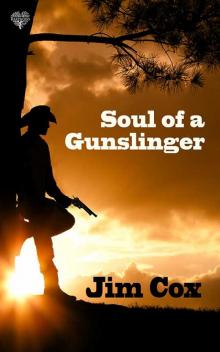 Soul of a Gunslinger
Soul of a Gunslinger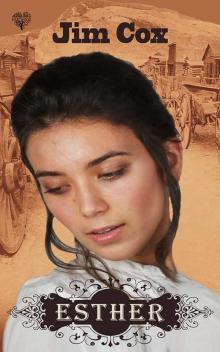 Esther
Esther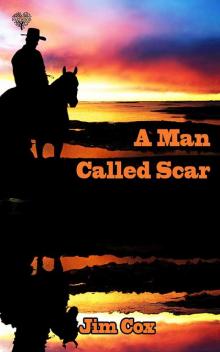 A Man Called Scar
A Man Called Scar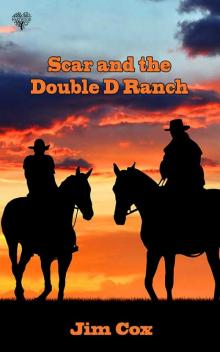 Scar and the Double D Ranch
Scar and the Double D Ranch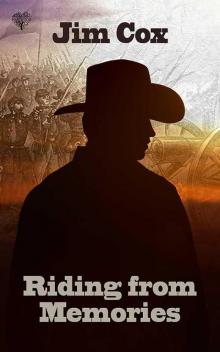 Riding from Memories
Riding from Memories